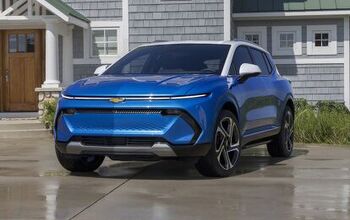GM And Chrysler Racing Towards Captive Finance?
News that GM is considering a number of options for a return to captive finance, has lit a fire under Chrysler CEO Sergio Marchionne, who tells the Detroit News that
One of the things that we do not wish under any circumstance is to have an uncompetitive relationship vis-À-vis GM
That would certainly be the case if GM bought up its recently-bailed-out former captive finance arm, GMAC (now known as Ally Financial). Chrysler relies on GMAC for leasing and loans just as much as GM does at the moment, so an Ally buyout would create major long-term problems. But even if GM created a new finance arm, Chrysler doesn’t seem to think that it will be able to survive without forming its own in-house finance department. Which would then compete with GM and Ally, to say nothing of the industry’s other finance competitors. But is the rush to captive finance going to be good for anyone?As a bank holding company, we have been able to consistently and cost-effectively provide financing to approximately 6,000 dealers and millions of consumers, which has led us to be the largest financing provider for both General Motors and Chrysler.
Today, we are better positioned to offer more stable funding through a variety of economic climates and to be more competitive from improved funding costs related to an increased level of deposit funding from our commercial bank and an improving business model.
The WSJ interprets this statement as Carpenter
signaling an independent stance following word that General Motors Co. might get back into auto lending.
After all, GM is only interested in Ally’s auto finance business, which is a far more consistent performer that the bank holding company’s long-troubled residential mortgage lending division. Besides, returning to the bosom of GM would force Ally to leave a lot of auto finance business on the table, not the least of which is Chrysler’s business. Marchionne warns that
We need to transition to a permanent, stable solution for Chrysler going forward. Once they tell me that GMAC is going to go back into General Motors, we need to have the time, the space to find an alternative solution to the long-term future of Chrysler.
As the WSJ’s Heard On The Street Blog puts it,
Ally’s separation has given it lower financing costs and freedom to serve other car makers, not just GM. “The value of Ally’s franchise is maximized by being separate,” says Adam Steer of CreditSights.
In theory, GM should be able to focus on its core business of making vehicles and make a good return on investment. Ally, focused on providing financing, should be able to do the same.
In other words, GM buying up Ally’s auto business would be good for GM and it’s profit and IPO chances, but it would be bad for Ally, and bad for Chrysler… both of which are still partially owned by the government. Moreover, buying Ally would also land another $16.3b in government debt on GM’s lap, giving critics of “Government Motors” even more populist ammunition. But then, if GM doesn’t buy Ally’s auto finance business but starts its own captive lender instead, it will have to compete with the company that already finances 87 percent of the vehicles on GM’s dealers’ lots. And Chrysler will have to start its own finance company. And then Ally won’t have enough business and its $16b+ bailout will have been wasted. Unless, of course, there’s a way to finesse the situation… because GM and Chrysler seem dead set on returning to captive finance.
More by Edward Niedermeyer
Latest Car Reviews
Read moreLatest Product Reviews
Read moreRecent Comments
- Redapple2 Love the wheels
- Redapple2 Good luck to them. They used to make great cars. 510. 240Z, Sentra SE-R. Maxima. Frontier.
- Joe65688619 Under Ghosn they went through the same short-term bottom-line thinking that GM did in the 80s/90s, and they have not recovered say, to their heyday in the 50s and 60s in terms of market share and innovation. Poor design decisions (a CVT in their front-wheel drive "4-Door Sports Car", model overlap in a poorly performing segment (they never needed the Altima AND the Maxima...what they needed was one vehicle with different drivetrain, including hybrid, to compete with the Accord/Camry, and decontenting their vehicles: My 2012 QX56 (I know, not a Nissan, but the same holds for the Armada) had power rear windows in the cargo area that could vent, a glass hatch on the back door that could be opened separate from the whole liftgate (in such a tall vehicle, kinda essential if you have it in a garage and want to load the trunk without having to open the garage door to make room for the lift gate), a nice driver's side folding armrest, and a few other quality-of-life details absent from my 2018 QX80. In a competitive market this attention to detai is can be the differentiator that sell cars. Now they are caught in the middle of the market, competing more with Hyundai and Kia and selling discounted vehicles near the same price points, but losing money on them. They invested also invested a lot in niche platforms. The Leaf was one of the first full EVs, but never really evolved. They misjudged the market - luxury EVs are selling, small budget models not so much. Variable compression engines offering little in terms of real-world power or tech, let a lot of complexity that is leading to higher failure rates. Aside from the Z and GT-R (low volume models), not much forced induction (whether your a fan or not, look at what Honda did with the CR-V and Acura RDX - same chassis, slap a turbo on it, make it nicer inside, and now you can sell it as a semi-premium brand with higher markup). That said, I do believe they retain the technical and engineering capability to do far better. About time management realized they need to make smarter investments and understand their markets better.
- Kwik_Shift_Pro4X Off-road fluff on vehicles that should not be off road needs to die.
- Kwik_Shift_Pro4X Saw this posted on social media; “Just bought a 2023 Tundra with the 14" screen. Let my son borrow it for the afternoon, he connected his phone to listen to his iTunes.The next day my insurance company raised my rates and added my son to my policy. The email said that a private company showed that my son drove the vehicle. He already had his own vehicle that he was insuring.My insurance company demanded he give all his insurance info and some private info for proof. He declined for privacy reasons and my insurance cancelled my policy.These new vehicles with their tech are on condition that we give up our privacy to enter their world. It's not worth it people.”


































Comments
Join the conversation
"In theory, GM should be able to focus on its core business of making vehicles and make a good return on investment. Ally, focused on providing financing, should be able to do the same." Ah, spoken from the Gospel of Wall Street and the MBAs. The theory of ever increasing specialization actually doesn't work very well in practice. The Theory of Specialization says that Google should be sticking to search engines, Apple should have stuck with computers, Oracle should still be a database company and IBM should have stuck to making hardware and software rather than building a massive business services empire. The WSJ's blogger is a simple minded person, like so many of his ilk are. Simple minded people take small theoretical examples and then attempt to build all encompassing economic rules from them. A few more examples are the Rational Man hypothesis and the theory of natural, National Comparative Advantage. Alas, you cannot be an effective manager if you try to take a simple minded theory and apply it to all situations. Every significant competitor to GM and Chrysler has an in-house finance arm. You don't see any of them in a hurry to turn that over to Ally, do you? Speaking of which, of course Ally thinks it is a bad idea for GM and/or Chrysler to reconstitute their own in-house finance operations. Duh, what else is Ally going to say?
Does Fiat have captive financing as well? That might solve the conundrum for Chrysler. There have been some good responses about the importance of captive financing that have opened my eyes, but I'm still bothered by the fact that GMAC rushed to be reclassified as a bank to get the bailout and restore themselves to healthy operation. I don't think it's fair for GM to be able to assume control of this 'healthy' company unless we start talking straight about GMAC as part of the total bailout money that GM received (most people seem to keep the two bailouts separate). Further to that, if they are a bank they will need to surrender that title and stop marketing to the general public. As per John's response, I'm sure they'd rather stay a bank now that they've tasted life on the other side of the fence.